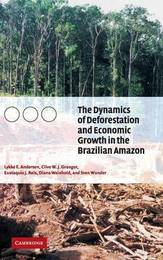
|
The Dynamics of Deforestation and Economic Growth in the Brazilian Amazon
Hardback
Main Details
Description
A multi-disciplinary team of authors analyze the economics of Brazilian deforestation using a large data set of ecological and economic variables. They survey the most up to date work in this field and present their own dynamic and spatial econometric analysis based on municipality level panel data spanning the entire Brazilian Amazon from 1970 to 1996. By observing the dynamics of land use change over such a long period the team is able to provide quantitative estimates of the long-run economic costs and benefits of both land clearing and government policies such as road building. The authors find that some government policies, such as road paving in already highly settled areas, are beneficial both for economic development and for the preservation of forest, while other policies, such as the construction of unpaved roads through virgin areas, stimulate wasteful land uses to the detriment of both economic growth and forest cover.
Author Biography
Chief Economist, Sustainable Development Department, Institute for Socio-Economic Research, Catholic University of Bolivia, La Paz. Chancellor's Associate Chair in Economics, University of California, San Diego. Winner of The Nobel Prize for Economics 2003. Director of Macroeconomic Studies, Institute for Applied Economic Research (IPEA), Rio de Janeiro. Reader in Economics, London School of Economics and Political Science. Centre for Development Research, Copenhagen.
ReviewsAdvance praise: A book on the Brazilian Amazon, the world's largest tropical forest, always demands one's attention and this volume is an especially worthy addition to the literature. The authors have drawn on all available data sources to assess the benefits and costs of land-use change in the region. Moreover, key findings are presented without resort to technical jargon, which guarantees that the book's impacts will be far-reaching.' Douglas Southgate, Ohio State University
|